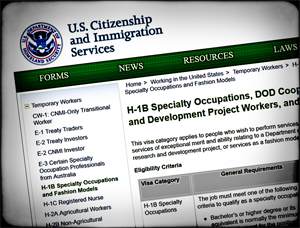
Earlier this year, President Trump signed an executive order to review the H-1B visa process as part of his "Buy American, Hire American" economic initiative. Specifically, the April 18 order directs the State, Labor, and Homeland Security departments to "suggest reforms to help ensure that H-1B visas are awarded to the most-skilled or highest paid petition beneficiaries."
Recently, news outlets have reported that the administration will likely make one of its first serious changes to the H-1B program (as spelled out in the DHS regulatory agenda discussed by my colleague John Miano). Specifically, the Department of Homeland Security intends to remove a 2015 rule that allowed the spouses of H-1B visa holders to work legally in the United States.
Under the proposed change, H-4 dependents (spouses and children of H-1B workers) would no longer have authorization to work on their own. This decision likely will make it more difficult for some potential H-1B workers to come to the United States, according to some reports. Advocates for expanding the H-1B program have critiqued the move.
In addition to the rule change, the administration has increased the level of scrutiny on H-1B applications. Since the election of President Trump, the number of challenged applications has risen. In November 2016, only 27.2 percent of applications required additional evidence. A year later, almost half of all applications (46.6 percent) required additional evidence. An article sympathetic to expanding the H-1B program described challenging H-1B applications as "a bureaucratic step that can slow an application or lead to its denial."
These are small but important steps toward reforming the H-1B visa system. Critics of the program point out that it is riddled with abuse and fraud. In November, my colleague David North discovered through his research that the government allowed a pizza cook to enter the United States through the H-1B visa.
It encourages many companies to replace American employees with cheaper, temporary H-1B workers. Examples of this are unfortunately all too common, such as when Walt Disney World and Southern California Edison (among others) laid off American IT professionals and required them to train their foreign replacements as a condition of receiving severance payments.
A bill in the current Congress sponsored by Sen. Chuck Grassley (R-Iowa) proposes to require completion of a U.S. degree as a qualification for "specialty occupation" eligibility. The bill would also abolish the current lottery-style allocation system for H-1B visas and would instead distribute visas with a preference for aliens who have earned a STEM degree from a college or university in the United States. The bill also includes language requiring the Department of Labor to monitor the program more closely, including the automatic auditing of companies whose workforce is comprised of 15 percent or more H-1B visa holders.
Additional changes to the program are sure to come as the Trump administration moves forward with its "America First" economic agenda and continues to address the shortcomings of the H-1B visa program.
